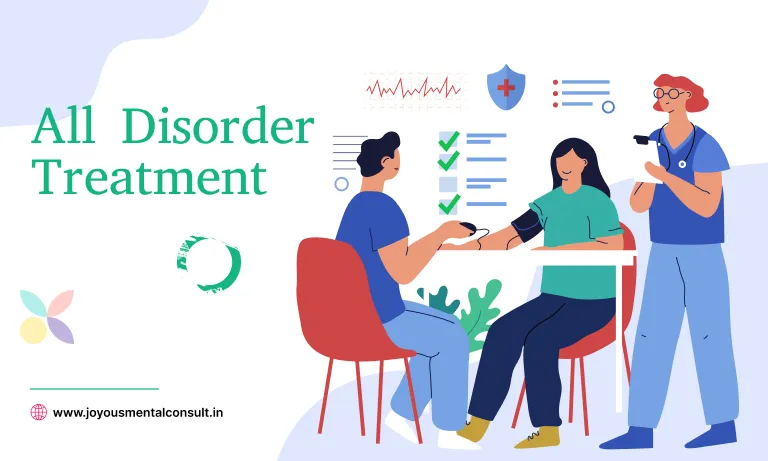What Is a Disorder?
Mental Disorders (also referred to as psychiatric disorders or mental illnesses) are conditions that impact one’s thoughts, emotions, behaviour or overall mental functioning in such a way that seriously interferes with everyday functioning and well-being. Their severity varies and symptoms can manifest themselves through intense emotions, distortion of thought patterns, behavioural changes and physical manifestations – to name just some of their effects.
Know the Types of Disorder
The different types of disorder that impacts the health of the individuals are:
- Acute Stress Disorder
- Autism Spectrum Disorder
- Body Dysmorphic Disorder
- Insomnia Disorder
- Dissociative Disorder
- Mood Disorder
Let’s discuss them in detail about these disorders for a proper understanding of them.
(A). Acute Stress Disorder
Acute Stress Disorder (ASD) is a mental health condition that may develop after experiencing trauma such as accidents, natural disasters or violence.
Symptoms
ASD symptoms generally emerge three to four weeks post-trauma and include flashbacks, nightmares, severe anxiety and avoidance of reminders of what happened; some individuals experiencing ASD also report dissociation – feeling detached from both surroundings or emotions.
Treatment
Cognitive-behavioral therapy (CBT) is often recommended as a treatment for ASD. CBT helps individuals understand and cope with trauma-inducing experiences more effectively, decreasing symptoms while helping prevent post-traumatic stress disorder (PTSD). In addition to psychotherapy, medication such as antidepressants or anxiety drugs are prescribed to counter severe symptoms further or facilitate therapy sessions.
(B). Autism Spectrum Disorder
Autism Spectrum Disorder (ASD) is a neurodevelopmental condition marked by various symptoms and challenges that impact development. However, its source remains unidentified; genetic and environmental influences likely play a part.
Symptoms
Signs of Autism Spectrum Disorder typically become evident early on and vary widely in severity. The symptoms range from impaired social interaction and communication abilities to repetitive behaviours. The other symptoms include restricted interests, struggles to maintain eye contact, understand social cues or create meaningful relationships.
Treatment
Treatment for autism spectrum disorder (ASD) should focus on increasing quality of life and functioning. Early intervention is critical. Early utilisation of behavioural therapies like Applied Behavior Analysis (ABA) can be used to target specific behaviours and enhance communication; speech therapy and occupational therapy may also help address speech or sensory-based needs. Medication may be prescribed to manage co-occurring conditions like anxiety, depression or hyperactivity; IEPs (individualised education plans) are often utilised as support systems.
(C). Body Dysmorphic Disorder
Body Dysmorphic Disorder (BDD) is a mental health condition characterised by an overwhelming preoccupation with perceived flaws or defects in one’s physical appearance that cause distress and impair daily living activities. Although its exact cause remains unknown, genetic, environmental, and psychological influences could all play a part.
Symptoms
Common symptoms of Body Dysmorphic Disorder are excessive concern about minor or imagined imperfections, excessive grooming or repeated mirror checks to check oneself in the mirror, and avoidance of social situations because of appearance-related anxiety. Individuals living with BDD often experience depression, anxiety and low self-esteem.
Treatment
Cognitive-behavioural therapy (CBT) aims to correct cognitive distortions and behaviours. Medication, such as selective serotonin reuptake inhibitors (SSRIs), may also help treat anxiety or depression symptoms; support groups and family therapy may provide further assistance.
(D). Insomnia Disorder
Difficulty falling or remaining asleep through repeated nights defines insomnia disorder. It often leads to impaired daytime functioning and impacts day-to-day operations. The causes may range from stress, anxiety and depression through medical conditions to lifestyle factors (irregular sleep schedule, caffeine or alcohol intake, etc.), medication treatment plans or prescription drugs as possible causes.
Symptoms
Common symptoms of insomnia can include difficulty falling asleep, and frequent awakenings during the nighttime hours. It also includes feeling unrefreshed upon awakening in the morning. Individuals may also experience daytime fatigue, irritability, concentration difficulties, and mood disturbances.
Treatment
Treatments for insomnia generally consist of both non-pharmacological and pharmacological approaches. Non-pharmacological strategies often include practising good sleep hygiene (i.e. maintaining regular sleeping schedules, creating comfortable environments to aid restful sleeping environments and limiting stimulating activities before bedtime), cognitive behavioural therapy for insomnia (CBT-I), and relaxation techniques.
The doctors might prescribe medications like sedative-hypnotics in certain cases. However, these tend to be temporary solutions and need careful management to avoid dependence and addiction.
(E). Dissociative Disorder
Dissociative disorder, or mental health conditions characterised by disruptions to consciousness, memory, identity and perception. These are the result of trauma or severe stress.
Symptoms
Symptoms may differ for everyone but often include dissociative amnesia – in which individuals forget significant events – or dissociative identity disorder (formerly multiple personality disorder), in which an individual experiences distinct identity states. Other symptoms could include depersonalisation (feeling disconnected from the body), derealisation (perceiving the external world as unreal) and identity confusion.
Treatment
Psychotherapy treatments typically consist of dialectical-behaviour therapy (DBT) or cognitive-behavioural therapy (CBT), designed to identify triggers and develop effective coping strategies; additionally, medications may be prescribed based on symptoms like anxiety or depression.
(F). Mood Disorder
Mood disorders are mental health conditions characterised by persistent disturbances to an individual’s emotional state. Their cause could stem from genetic, biological, environmental or psychological causes – this includes depression and bipolar disorder, among others.
Symptoms
Depression symptoms typically include persistent sadness, loss of interest in activities once enjoyed, altered appetite and sleep patterns. It also includes fatigue and feelings of worthlessness or guilt. Bipolar disorder involves extreme mood swings with episodes of depression and manic highs frequently accompanied by reckless and risky behaviour.
Treatment
Treatment for mood disorder typically entails multiple therapies. Psychotherapy – such as cognitive-behavioural therapy (CBT) or interpersonal psychotherapy (IPT) – is effective at helping individuals address negative thought patterns and create effective coping mechanisms.
The psychiatrist can also prescribe medications like antidepressants (for depression) or mood stabilisers (for bipolar disorder). Lifestyle modifications like regular physical activity, balanced nutrition and ample restfulness could supplement these medications as part of an integrated strategy to treat mood disorders.
